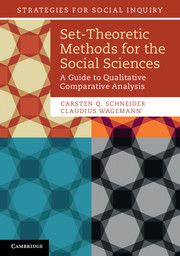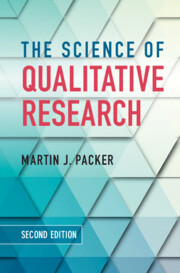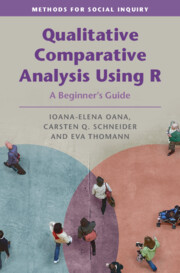Set-Theoretic Methods for the Social Sciences
Qualitative Comparative Analysis (QCA) and other set-theoretic methods distinguish themselves from other approaches to the study of social phenomena by using sets and the search for set relations. In virtually all social science fields, statements about social phenomena can be framed in terms of set relations, and using set-theoretic methods to investigate these statements is therefore highly valuable. This book guides readers through the basic principles of set theory and then on to the applied practices of QCA. It provides a thorough understanding of basic and advanced issues in set-theoretic methods together with tricks of the trade, software handling and exercises. Most arguments are introduced using examples from existing research. The use of QCA is increasing rapidly and the application of set-theory is both fruitful and still widely misunderstood in current empirical comparative social research. This book provides the comprehensive guide to these methods for researchers across the social sciences.
- A useful tool for scholars interested in learning the methods, instructors who teach courses, users who want to improve their skills, and readers and reviewers who need to evaluate manuscripts based on set-theoretic methods
- Features 'At a Glance' boxes which summarise the most important issues required for the reader to understand the subsequent arguments
- Gives state of the art, innovative and new solutions to long-standing method-inherent problems
- Contains many real-life examples, clearly demonstrating the fields where QCA can be applied
Reviews & endorsements
'We have long needed a volume that comprehensively, clearly, and systematically covers Boolean and fuzzy set methodologies. Schneider and Wagemann have filled this need with their book, and it will certainly play a central role in guiding research and teaching.' Gary Goertz, University of Arizona
'For relationships that can be viewed in terms of sufficiency or necessity, set-theory provides a powerful tool to model causality. QCA, in its various forms, provides a bridge between single case studies and quantitative analysis of linkages among interval-level or ratio variables across multiple cases by providing the tools to examine relationships in set-theoretic terms among dichotomies or concepts defined as fuzzy sets. This clearly written and comprehensive introduction to QCA, which insists on causal analyses that are explicitly intended to study possible multiple pathways to given outcomes, is must-reading for social scientists who wish to expand their methodological horizons and get away from the all too common 'throw as many variables as possible into the regression hopper and see which ones come up statistically significant' form of barefoot empiricism.' Bernie Grofman, University of California, Irvine
'This is the first volume that bridges the fundamentals of set-theoretic methods with the many ongoing innovations. A must for anyone aiming to exploit the full potential of the QCA toolbox.' Benoît Rihoux, Université catholique de Louvain, Belgium, and COMPASSS international network
Product details
August 2012Paperback
9781107601130
370 pages
244 × 173 × 18 mm
0.7kg
37 b/w illus. 55 tables
Available
Table of Contents
- Introduction
- Part I. Set-Theoretic Methods: The Basics:
- 1. Sets, set membership, and calibration
- 2. Notions and operations in set theory
- 3. Set relations
- 4. Truth tables
- Part II. Neat Formal Logic Meets Noisy Social Science Data:
- 5. Parameters of fit
- 6. Limited diversity and logical remainders
- 7. The truth table algorithm
- Part III. Potential Pitfalls and Suggestions for Solutions:
- 8. Potential pitfalls in the standard analysis procedure and suggestions for improvement
- 9. Potential pitfalls in the analysis of necessity and sufficiency and suggestions for avoiding them
- Part IV. Variants of QCA as a Technique Meet QCA as an Approach:
- 10. Variants of QCA
- 11. Data analysis technique meets set-theoretic approach
- 12. Looking back: looking ahead
- Glossary.





